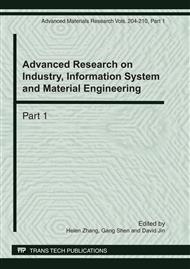p.645
p.649
p.663
p.672
p.678
p.683
p.687
p.691
p.695
A Fuzzy Trust Management Based on Outlier Identification for P2P
Abstract:
In an open P2P network environment, it’s full of various malicious actions ,dishonesty, deceit, selfish and so on. So it’s necessary to build a robust trust manage system to keep the community run healthily. There are mainly two kinds of trust system, one is based on Global Trust. the system maintains a Global Trust value for every peer. The other one is based on peer itself, it rates the object peer trust according to historical transactions between them or recommendation from the other peers. Because the second trust manage system mainly bases on Fuzzy algorithm, we call it Fuzzy Trust system. The paper will focus on Fuzzy Trust system, we will introduce the related algorithms and involve Outlier Identification algorithm to alleviate the risk from malicious action.
Info:
Periodical:
Pages:
678-682
Citation:
Online since:
February 2011
Authors:
Keywords:
Price:
Сopyright:
© 2011 Trans Tech Publications Ltd. All Rights Reserved
Share:
Citation:


